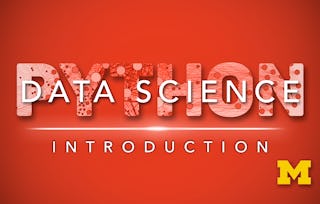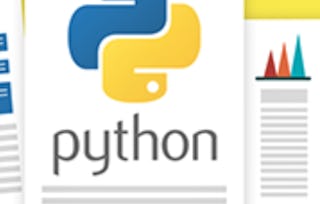Dieser Kurs bietet eine Einführung in grundlegende Data Science-Techniken mit Python. Die Teilnehmer werden in Kernkonzepte wie Data Frames und die Verknüpfung von Daten eingeführt und lernen, wie man Datenanalysebibliotheken wie pandas, numpy und matplotlib verwendet. Dieser Kurs bietet einen Überblick über das Laden, Prüfen und Abfragen von realen Daten und über die Beantwortung grundlegender Fragen zu diesen Daten. Die Kursteilnehmer erwerben Fähigkeiten in der Datenaggregation und -zusammenfassung sowie in der grundlegenden Datenvisualisierung.

Datenanalyse mit Python

Datenanalyse mit Python
Dieser Kurs ist Teil von Spezialisierung für Einführung in die Programmierung mit Python und Java

Dozent: Brandon Krakowsky
34.257 bereits angemeldet
Bei enthalten
429 reviews
Empfohlene Erfahrung
Was Sie lernen werden
Anwendung grundlegender Techniken der Datenwissenschaft mit Python
Kernkonzepte wie Data Frames und die Verknüpfung von Daten verstehen und anwenden und Datenanalysebibliotheken wie pandas, numpy und matplotlib verwenden
Demonstrieren Sie, wie Sie reale Daten laden, untersuchen und abfragen können, und beantworten Sie grundlegende Fragen zu diesen Daten
Analysieren Sie die Daten weiter, indem Sie die erlernten Fähigkeiten zur Datenaggregation und -zusammenfassung sowie zur grundlegenden Datenvisualisierung anwenden
Kompetenzen, die Sie erwerben
- Kategorie: Pivot-Tabellen und Diagramme
- Kategorie: Grundsätze der Programmierung
- Kategorie: Datenstrukturen
- Kategorie: Matplotlib
- Kategorie: Explorative Datenanalyse
- Kategorie: Datenanalyse
- Kategorie: Pandas (Python-Paket)
- Kategorie: Datenvisualisierung
- Kategorie: Vorverarbeitung der Daten
- Kategorie: Histogramm
- Kategorie: NumPy
- Kategorie: Datenverarbeitung
- Kategorie: Streudiagramme
- Kategorie: Datenvisualisierungssoftware
- Kategorie: Datenmanipulation
- Kategorie: Jupyter
- Kategorie: Daten bereinigen
- Kategorie: Python-Programmierung
- Kategorie: Daten importieren/exportieren
Wichtige Details

Zu Ihrem LinkedIn-Profil hinzufügen
7 Aufgaben
Erfahren Sie, wie Mitarbeiter führender Unternehmen gefragte Kompetenzen erwerben.

Erweitern Sie Ihre Fachkenntnisse
- Lernen Sie neue Konzepte von Branchenexperten
- Gewinnen Sie ein Grundverständnis bestimmter Themen oder Tools
- Erwerben Sie berufsrelevante Kompetenzen durch praktische Projekte
- Erwerben Sie ein Berufszertifikat zur Vorlage

In diesem Kurs gibt es 3 Module
In diesem ersten Modul erhalten Sie einen Überblick über das Laden, Prüfen und Erforschen von Daten mithilfe der einfachen csv-Bibliothek von Python. Für den Einstieg enthält dieses Modul einen kurzen Überblick über Jupyter Notebook und eine knappe Übersicht über die Grundlagen von Python, einschließlich Datenstrukturen, Schleifen und Funktionen. Dieses Modul zeigt den Studenten eine eingehende Analyse von Daten, die in einer .csv-Datei gespeichert sind, einschließlich grundlegender Abfragen, Ansätze für den Umgang mit Datenfehlern und wie man Daten nach einer Vielzahl von Kriterien filtert und sortiert.
Das ist alles enthalten
8 Videos10 Lektüren3 Aufgaben1 Programmieraufgabe
In diesem Modul werden die Studenten mit Kernkonzepten wie dem Datenrahmen und der Verknüpfung von Daten vertraut gemacht. Die Teilnehmer sammeln Erfahrungen mit Pandas, einer Standardbibliothek für die Datenanalyse, um reale Daten zu laden und abzufragen und Fragen zu diesen Daten zu beantworten. In diesem Modul wird gezeigt, wie man erweiterte Filter und Indizierungen vornimmt, Teilmengen von Daten zerlegt, Datenattribute in Abfrageergebnissen einschränkt und grundlegende Berechnungen mit den Daten durchführt. Sie erfahren, wie Sie ein einfaches Empfehlungssystem aufbauen und wie Sie Daten bereinigen, mit fehlenden Werten umgehen und neue Daten erstellen können.
Das ist alles enthalten
14 Videos5 Lektüren2 Aufgaben2 Programmieraufgaben
Dieses Modul bringt die Datenanalyse einen Schritt weiter, indem es einen Überblick über den Prozess der Aggregation, Zusammenfassung und Visualisierung von Daten gibt. Die Teilnehmer lernen das Konzept der Gruppierung und Indizierung von Daten kennen und erfahren, wie man die Ergebnisse in einer Pivot-Tabelle mit Pandas anzeigt. In diesem Modul wird auch gezeigt, wie man Daten mit Hilfe eines Histogramms und eines Scatterplots in Jupyter Notebook aufbereitet und visualisiert. Die Teilnehmer erwerben Fähigkeiten in der Datenaggregation und -zusammenfassung sowie in der grundlegenden Datenvisualisierung. Darüber hinaus werden die Teilnehmer Erfahrungen mit Datenanalysebibliotheken wie numpy und matplotlib sammeln.
Das ist alles enthalten
18 Videos6 Lektüren2 Aufgaben2 Programmieraufgaben
Erwerben Sie ein Karrierezertifikat.
Fügen Sie dieses Zeugnis Ihrem LinkedIn-Profil, Lebenslauf oder CV hinzu. Teilen Sie sie in Social Media und in Ihrer Leistungsbeurteilung.
Dozent

Mehr von Datenanalyse entdecken
 Status: Kostenloser Testzeitraum
Status: Kostenloser TestzeitraumUniversity of Michigan
 Status: Kostenloser Testzeitraum
Status: Kostenloser Testzeitraum Status: Kostenloser Testzeitraum
Status: Kostenloser Testzeitraum
Warum entscheiden sich Menschen für Coursera für ihre Karriere?

Felipe M.

Jennifer J.

Larry W.

Chaitanya A.
Bewertungen von Lernenden
- 5 stars
68,53 %
- 4 stars
21,91 %
- 3 stars
5,12 %
- 2 stars
1,39 %
- 1 star
3,03 %
Zeigt 3 von 429 an
Geprüft am 19. Dez. 2022
This course is very good especially for newbies. i have learnt alot. Teaching is very sample anybody can understand
Geprüft am 12. Apr. 2021
Excellent course. Assignments /home work explaination need to be rethought. Special thanks to Jahnavi for helping through out the course.
Geprüft am 7. Jan. 2022
this course was perfect for me, I learned alot from it.I want to thank Jahnavi Chowdary quck reply and you helping me through out, you also deserve five stars

Neue Karrieremöglichkeiten mit Coursera Plus
Unbegrenzter Zugang zu 10,000+ Weltklasse-Kursen, praktischen Projekten und berufsqualifizierenden Zertifikatsprogrammen - alles in Ihrem Abonnement enthalten
Bringen Sie Ihre Karriere mit einem Online-Abschluss voran.
Erwerben Sie einen Abschluss von erstklassigen Universitäten – 100 % online
Schließen Sie sich mehr als 3.400 Unternehmen in aller Welt an, die sich für Coursera for Business entschieden haben.
Schulen Sie Ihre Mitarbeiter*innen, um sich in der digitalen Wirtschaft zu behaupten.
Häufig gestellte Fragen
die einzige Mathematik, die Sie für diese Specializations benötigen, ist Arithmetik und grundlegende Konzepte der Logik.
Wenn Ihnen dieser Kurs gefallen hat, empfehlen wir Ihnen die Kurse 1, 3 und 4 der Reihe!
Wenn Sie über die Grundlagen der Programmierung hinaus die Grundlagen der Informatik erlernen möchten, sollten Sie in Erwägung ziehen, sich für den Master of Computer and Information and Technology (MCIT) an der University of Pennsylvania zu bewerben, ein Informatik-Masterprogramm der Ivy League für Menschen ohne Informatikhintergrund. Für eine Erfahrung auf dem Campus, erkunden Sie hier. Wenn Sie eine Online-Umgebung bevorzugen, bewerben Sie sich bei MCIT Online. Die Vorlesungen dieser Reihe werden nämlich auch im Online-Studiengang verwendet! Das Specializations-Zertifikat wird von der Zulassungskommission positiv bewertet, also erwähnen Sie es unbedingt bei Ihrer Bewerbung.
Um Zugang zu den Kursmaterialien und Aufgaben zu erhalten und um ein Zertifikat zu erwerben, müssen Sie die Zertifikatserfahrung erwerben, wenn Sie sich für einen Kurs anmelden. Sie können stattdessen eine kostenlose Testversion ausprobieren oder finanzielle Unterstützung beantragen. Der Kurs kann stattdessen die Option "Vollständiger Kurs, kein Zertifikat" anbieten. Mit dieser Option können Sie alle Kursmaterialien einsehen, die erforderlichen Bewertungen abgeben und eine Abschlussnote erhalten. Dies bedeutet auch, dass Sie kein Zertifikat erwerben können.
Weitere Fragen
Finanzielle Unterstützung verfügbar,


